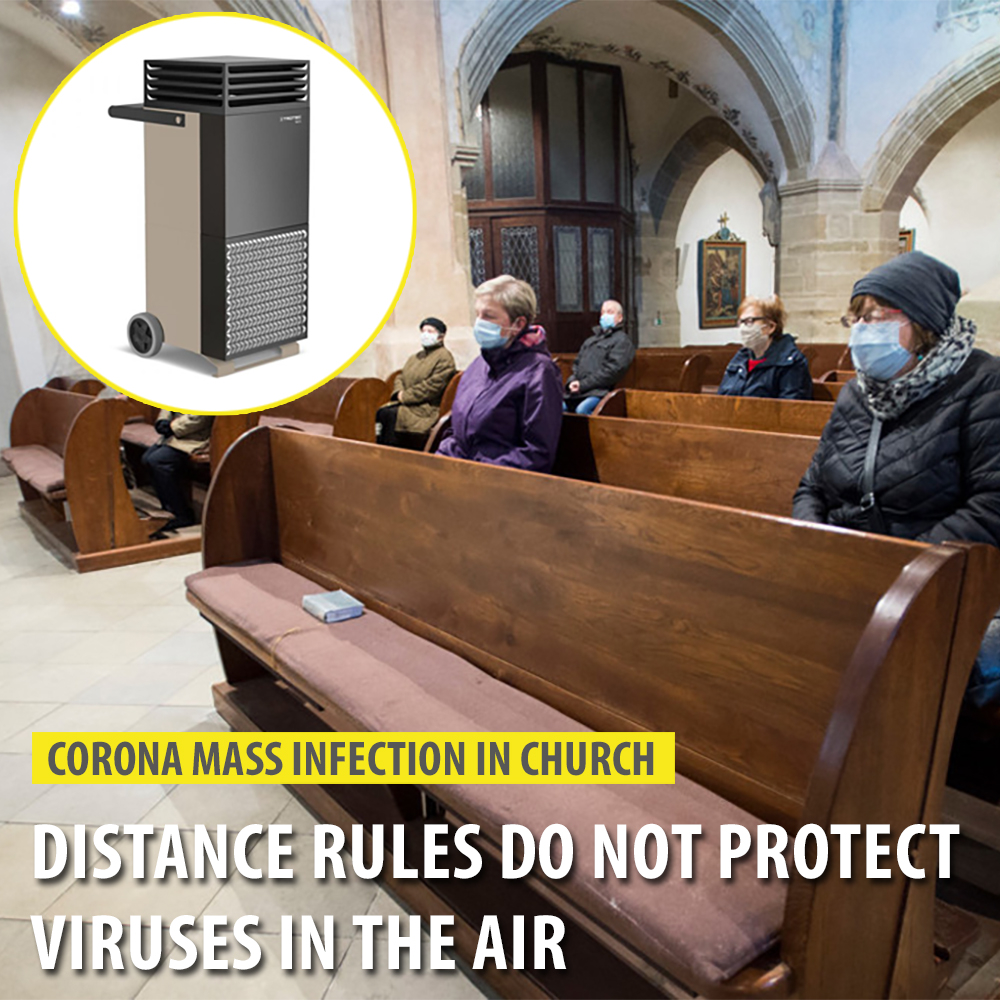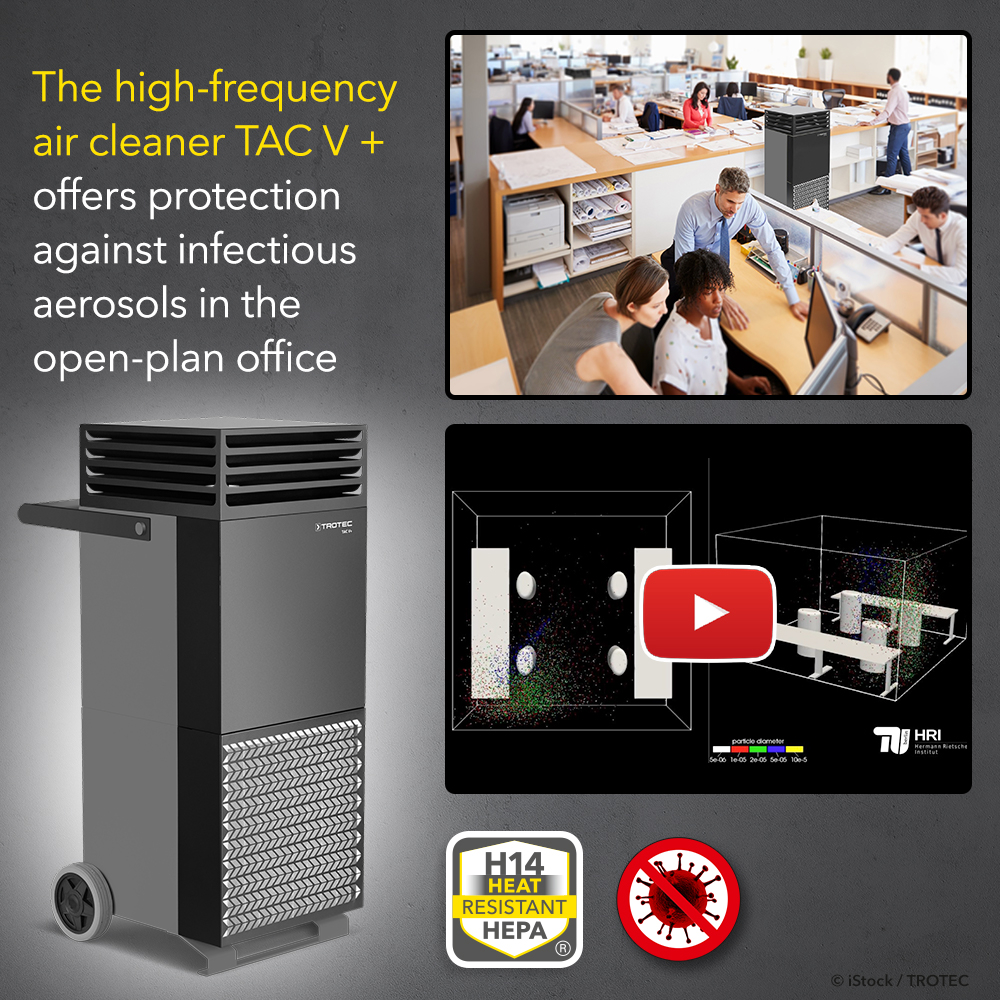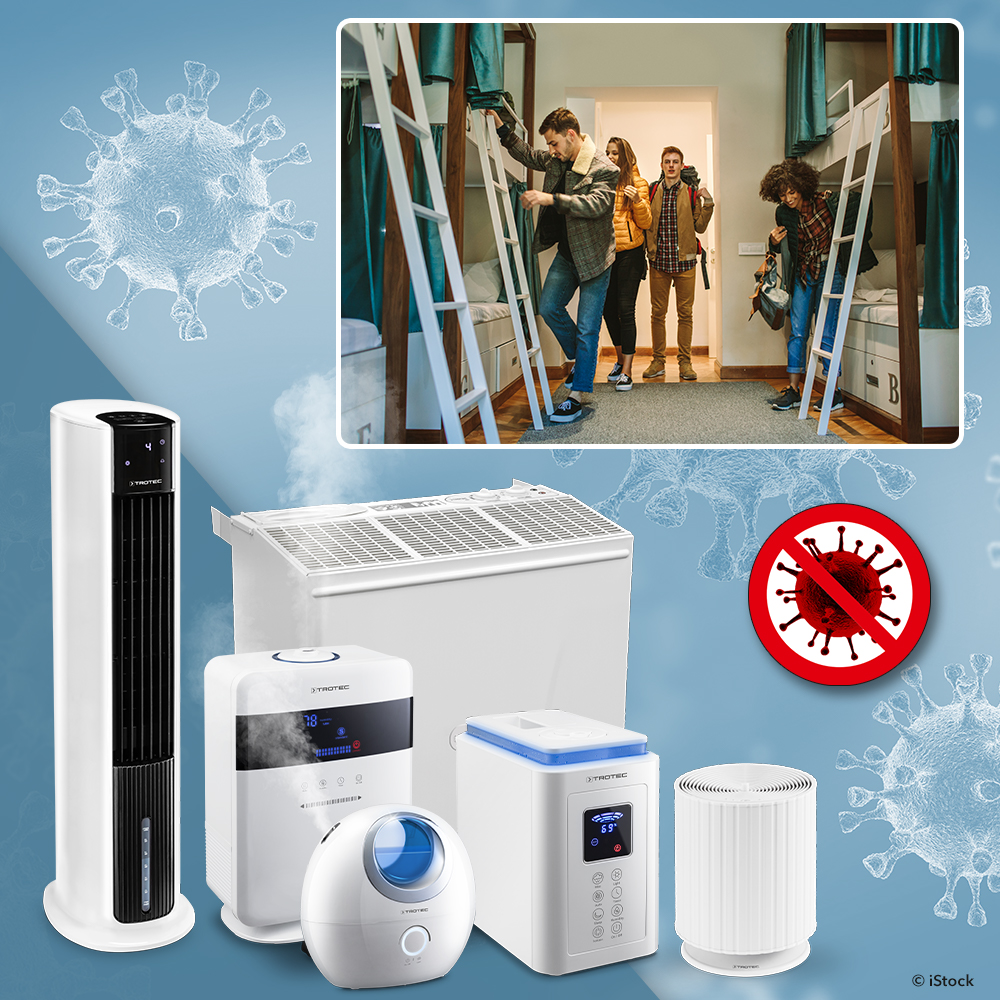
 A new case of infection in Frankfurt shows how the importance of air purifiers in houses of worship and prayer. Despite the fulfilment of all requirements, a mass infection occurred after a church service. Experts are therefore increasingly demanding: only a permanent virus air purifier can protect against the inhalation of viral aerosols, which are expelled into the room, especially during loud prayer and singing, and these can remain in the air for hours. The new TAC V+ high-frequency air purifier from Trotec obviously completes insufficient hygiene concepts by providing effective protection against the risk of infection via indoor air. The air purifier quickly and effectively filters infectious aerosols from the air in the room – before they can enter the body via the respiratory tract.
A new case of infection in Frankfurt shows how the importance of air purifiers in houses of worship and prayer. Despite the fulfilment of all requirements, a mass infection occurred after a church service. Experts are therefore increasingly demanding: only a permanent virus air purifier can protect against the inhalation of viral aerosols, which are expelled into the room, especially during loud prayer and singing, and these can remain in the air for hours. The new TAC V+ high-frequency air purifier from Trotec obviously completes insufficient hygiene concepts by providing effective protection against the risk of infection via indoor air. The air purifier quickly and effectively filters infectious aerosols from the air in the room – before they can enter the body via the respiratory tract. The importance of permanent air purifiers in restaurants is shown by the first corona outbreak shortly after many restaurants reopened. Only a permanent viral air purifier protects against the inhalation of viral aerosols, which are emitted into the room when speaking and can remain in the air for hours. The new TAC V+ high-frequency air purifier from Trotec completes insufficient hygiene measures with effective protection against the risk of infection via indoor air. The new type of air purifier filters infectious aerosols quickly and effectively from indoor air – before they are inhaled by employees or customers.
The importance of permanent air purifiers in restaurants is shown by the first corona outbreak shortly after many restaurants reopened. Only a permanent viral air purifier protects against the inhalation of viral aerosols, which are emitted into the room when speaking and can remain in the air for hours. The new TAC V+ high-frequency air purifier from Trotec completes insufficient hygiene measures with effective protection against the risk of infection via indoor air. The new type of air purifier filters infectious aerosols quickly and effectively from indoor air – before they are inhaled by employees or customers. Thousands of saliva droplets in varying size are expelled into the air while talking or sneezing. Large droplets – which cough and sneeze guards, visors and mouth-nose masks are meant to protect against in times of the coronavirus. But even the smallest microparticles too, the so-called aerosols. These aerosols are now being researched intensively in the laboratories of the TU Berlin, in order to be able to better estimate the risk of infection with coronavirus. Together with doctors and virologists, the engineers at Trotec are also working on technical solutions aimed at filtering infectious aerosols out of the air in rooms. As soon as the first cases of infection were announced in Heinsberg, work commenced on a high-frequency air purifier with special HEPA filtration, in order to be able to keep, in particular, open-plan offices, restaurants or comparable extensive areas permanently free of infectious aerosols. This is because a mobile solution with sufficiently high air purification rate has so far not been available to remove viral-laden aerosols from the entire room air via the filter specially developed for this in as short a time as possible. After just 5 months development time, the new TAC V+ air purifier is now available in various versions and ready for use in numerous applications.
Thousands of saliva droplets in varying size are expelled into the air while talking or sneezing. Large droplets – which cough and sneeze guards, visors and mouth-nose masks are meant to protect against in times of the coronavirus. But even the smallest microparticles too, the so-called aerosols. These aerosols are now being researched intensively in the laboratories of the TU Berlin, in order to be able to better estimate the risk of infection with coronavirus. Together with doctors and virologists, the engineers at Trotec are also working on technical solutions aimed at filtering infectious aerosols out of the air in rooms. As soon as the first cases of infection were announced in Heinsberg, work commenced on a high-frequency air purifier with special HEPA filtration, in order to be able to keep, in particular, open-plan offices, restaurants or comparable extensive areas permanently free of infectious aerosols. This is because a mobile solution with sufficiently high air purification rate has so far not been available to remove viral-laden aerosols from the entire room air via the filter specially developed for this in as short a time as possible. After just 5 months development time, the new TAC V+ air purifier is now available in various versions and ready for use in numerous applications. It is no longer an open secret: In addition to droplet and smear infection, the coronavirus also spreads via aerosols in room and breathing air. Until a few weeks ago, this warning was primarily being spread by foreign authorities such as the CDC (Centers for Disease Control and Prevention) or numerous scientific studies – but it is now increasingly finding its way into the German media landscape.
It is no longer an open secret: In addition to droplet and smear infection, the coronavirus also spreads via aerosols in room and breathing air. Until a few weeks ago, this warning was primarily being spread by foreign authorities such as the CDC (Centers for Disease Control and Prevention) or numerous scientific studies – but it is now increasingly finding its way into the German media landscape.


 As a hairdresser, you have probably jumped back and forth between reception and waiting area, sink and chair in the last few days. Even if you’ve almost always managed to comply with the strict hygiene rules in the process, as a responsible operator you should keep an eye on the particular danger constituted by corona virus: In your salon, too, there is another particularly high risk of infection lurking beyond the familiar droplet infection – the so-called ‘aerosol’. Professor Dr. Roland Netz from the Institute for Theoretical Physics at the University of Berlin has the explanation for this phenomenon – and also for the solution…
As a hairdresser, you have probably jumped back and forth between reception and waiting area, sink and chair in the last few days. Even if you’ve almost always managed to comply with the strict hygiene rules in the process, as a responsible operator you should keep an eye on the particular danger constituted by corona virus: In your salon, too, there is another particularly high risk of infection lurking beyond the familiar droplet infection – the so-called ‘aerosol’. Professor Dr. Roland Netz from the Institute for Theoretical Physics at the University of Berlin has the explanation for this phenomenon – and also for the solution…